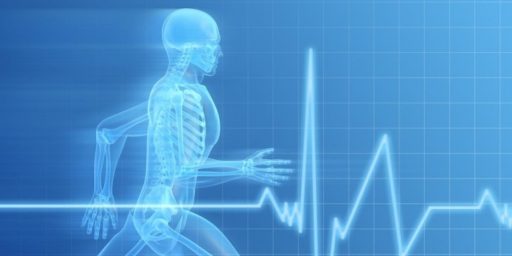Moderate Exercise and Weight Loss
For years, we’ve been told that a few minutes of moderate exercise a day will lead to amazing health benefits. A new study, though, indicates that significant weight loss isn’t among them:
Obesity experts agree that daily exercise is essential for good health, but whether it can successfully lead to long-term weight loss is a question of much debate. What has become increasingly clear, however, is that the conventionally accepted advice — 30 minutes of moderate-intensity activity most days of the week — is probably insufficient to spur any real change in a person’s body weight. A study published July 28 in the Archives of Internal Medicine adds to the burgeoning scientific consensus: when it comes to exercise for weight loss, more is better. It suggests that obese people would have to exercise at least an hour at a time to see any significant difference in their weight.
Which stands to reason, really. My lifestyle is pretty sedentary during the week: Wake up, work in front of the computer for a couple of hours, drive to the office, sit in front of the computer a few hours, drive home, sit in front of the computer some more, eat dinner, sit in front of the television for a couple hours, go to bed. Even so, I probably walk 30 minutes a day just between my desk, the coffee machine, and the bathroom. Walking to get lunch, on the days I don’t bring my own, probably gives me 20 minutes. Simply put, it’s ridiculously hard not to get 30 minutes of moderate activity on a daily basis if you’re able bodied.
Of course, no report on obesity would be complete without a “not that there’s anything wrong with that” disclaimer telling you it’s not your fault:
Still, the underlying question remains: are diet and exercise a reliable cure for obesity? Modern-day obesity researchers are skeptical — achieving thinness, they say, is not simply a matter of willpower. Research suggests that weight may largely be regulated by biology, which helps determine the body’s “set point,” a weight range of about 10 lbs. to 20 lbs. that the body tries hard to defend. The further you push you weight beyond your set point — either up or down the scale — some researchers say, the more your body struggles to return to it. That might help to explain why none of the women in Jakicic’s study managed to lose much more than 10% of their body weight. After two years on a calorie-restricted diet, keeping up more than an hour of physical activity five days a week on average, most were still clinically overweight (though much less so than before). But what Jakicic and other obesity researchers stress is that a 10% reduction in body weight represents a tremendous boon for overall well-being, lowering blood pressure, improving heart health and reducing the risk of Type 2 diabetes. For the obese, the end goal should not be thinness, but health and self-acceptance, which are more realistic and beneficial objectives. “The women’s health was absolutely improved,” Jakicic says.
What none of these studies ever explain to my satisfaction is why, if obesity is essentially random, it suddenly appeared on a large scale in Western society about thirty years ago and why you don’t see random fit kids in those television reports of famine in Africa.
via Edythe






Gary Taube’s book Good Calories Bad Calories goes into great detail on this, citing reports from missionary and frontier doctors who saw insignificant frequencies of obesity, heart disease, and cancer in these countries BEFORE they adopted Western high-carb (both simple and complex, that is) diets.
His book comes out in paperback this month, and the intellecutal history of nutrition research is thoroughly discussed. Surprisingly great. (No, I’m not Taubes!)
I had to switch to a low carb diet because of blood sugar problems, which makes it very easy to stay slim. It’s all in the carbs.
I need to finish reading that book. It’s just that he documents his position so well, even after he’s already convinced me of the validity of his point, that I’ve found the book at bit tedious.
Boyd makes a good point. It’s not a book, it’s a planet – he spent five years researching it. It’s an amazing document, esp. his take on people who say “calories in = calories out” mantra, and his reframing of the directionality of the first law of thermodynamics.
His 2 lectures are online, and they are great introductions to his position. Much better than reading 600 pages of insulin=bad, carbs=bad ad infinitum.
http://webcast.berkeley.edu/event_details.php?webcastid=21216
You know you’ve hit ideology when a scientist misinterprets their OWN work.
The whole “moderate exercise” thing always struck me as extraordinarily lame.
I am at the health club every day and the preponderance of fat people limit themselves to REALLY slow walking on the treadmill. It is entirely a game of “pretend workouts,” since they are not even breaking a sweat. They feel like they are “doing the right thing” by “exercising” in order to justify eating a a box of Ho-Hos for lunch.
In reality, they are wasting their time watching Oprah while barely walking.
The people who are not fat at my health club all engage in high-intensity exercise: squash, basketball, rowing machine, or free weights.
Hopefully the obese will get the clue that you actually have to WORK to get in shape. Unfortunately there is an entire industry that has developed around the literal metaphor of “having your cake and eating it too”–just visit your local Curves for affirmative evidence.
Complex issue, for the physiology of fat metabolism is not well understood. Only recently has it been shown that fat cells do have a capacity to regenerate and hormonal control is still murky. My own view?
Part of the answer lies in diet, but more important is that old reptilian brain, the hypothalamus. Lying in that structure is a satiety center, that tells us that we have eaten enough. Gross lesions in selected areas of the hypothalamus in rats will cause either complete loss of appetite, or indeed, compulsive over eating…
In your closing sentence: “
Is fit (my italics) meant to be fat?
Off to the summer cabin again, so I will be on the dark side of the web. A relief for a slow thinker and writer like myself.
In closing I should point out to you that the French, who have elevated the preparation of sweet breads to a culinary art form, are considerably leaner than Americans. While in Canada you missed a major chance to lose weight!!!
“why you don’t see random fit kids in those television reports of famine in Africa.â€
Because like every reporter, they get to choose what images you see. There are fit people even in the famine countries, although it is not random as why they are fit.
Anyone who says that “weight is regulated by biology” should be thrown out of the university by an angry mob from the department of physics. Yes, your body may struggle to return to a certain weight, but unfortunately it can only really do that in one direction. If you, as Triumph so aptly remarks, shovel down the Ho-Hos at lunch and never exercise then your body has no means by which to return to its desired point. You must use diet and exercise to help your body.
People who say “calories in == calories out” aren’t repeating some irrational religious mantra. They say that because it’s an inviolable law of the universe.
Baker wins the gold medal! And as always, misunderstands the role of the laws of thermo with respect to weight loss.
I’ve seen the Taubes video, and he addresses the gross error in Baker’s religious certainty. No one is saying the laws of thermo aren’t true. I believe the poster above referred to the directionality of the laws, something very, very different.
Ah, but then Jeffrey would have to stop and think. Watch the video, Taubes addresses precisely this inability to think. World class scientists do it, so why shouldn’t he?
I bet he neither budges an inch, nor watches the video to correct his mistake…
Interesting thesis. My own experience with this has been you have to work at it in order to achieve your goals. Joined a gym and hired a trainer Feb 2007 and been working out ever since, although I’ve taken breaks from the trainer at times for financial reasons – hiring one isn’t cheap. Weight training for 45 minutes 2x per week, and at least 2x 30 minute cardio sessions. I’m down 70 lbs and cut my body fat % by over half. I’m 10 lbs off my HS football playing weight – 22 years later. The big thing for me was to control my calorie intake and slowly ramp up the amount of additional activity (I jog 3x a week and walk my Lab 4-5x a week now) I do each week – and finding the time to do it. Persistence is really a key, as is stepping on the scale and refocusing if you oscillate the wrong direction a bit.
I added 2 15-20 semi strenuous bike rides a day (4-5 days a week) and a bit of extra walking without substantially changing my caloric intake (or fat/carb/protein ratio) and it had a dramatic effect on both my health and weight (~40 lbs) over about 6 mos. After that point I reached a new equilibrium and my weight and % fat remained more or less constant as long as my lifestyle did.
At least for me and the people I know regularly engaging in ~30 min of aerobic exercise effects both health and excess weight. Adding up trips to the kitchen, coffee machine, and toilet don’t count towards your 30 min.
Chum I’ve read Taubes’ articles over the years but his game doesn’t explain the real world. Here in the real world, lifestyle makes _all_ the difference. There’s nothing in his worldview to explain the fact that people in big dense cities like New York and San Francisco are not obese like people in other parts of the nation. Obesity rates in our big cities are in the low single digits while being > 60% in the country at large. That’s not explained by Taubes’ shaky diet theories. It _is_ explained by the fact that people in big dense cities walk everywhere, which reinforces the exercise boosters. And, yes, it reinforces the laws of thermodynamics which after all don’t need reinforcing because they are iron-clad.
Baker
It is much more complicated than that. Exercise and lifestyle has influence on one’s weight but biology does as well. Type of exercise and lifestyle goes far beyond than if one is active or how many calories one intakes. Different exercising regime will give different results. Genetics have a great influence as well as metabolism. Also it isn’t a one way deal. In college I had fellow football players that would take in massive amounts of calories and couldn’t gain the weight they wanted while others did. The same things happen with gaining strength, speed and quickness. People’s bodies have different predispositions. Not that one cant’ adjusts their body with work or lack of.
Keep in mind that many obesity studies use the height/weight index which is highly inaccurate.
@Fausta
I have to agree with Fausta, here. Three weeks ago, I cut out all the refined carbs (bread, pasta, essentially, any of that white stuff…). To date, I’ve lost about 12 pounds. It’s had another benefit. I have pretty good case of arthritis, and I suffered from pronounced stiffness, systemically, upon waking. Since I’ve cut that stuff out of my diet, I don’t seem to have any of that stiffness any more. Refined carbs, of the white variety, are inflammatory agents I’ve been told. (I still drink wine, eat the occassion ice cream cone…oh, and I play golf 3-4 times a week, and now I can walk the course).
I realize this is anecdotal, but it is my experience.
Cutting refined sugars or all/most carbs out of your diet almost always results in less calories in. Less calories in and same calories out gives you a pretty good shot at loosing excess weight.
I think the mechanism (involved in reduced refined carbs) involves a reduction in circulating insulin, which results in lipolysis.
You really have to put in the work to lose weight and get fit, but i think what most experts want people to do with ’30 minutes a day’ is to get at least SOME exercise. Most Americans are completely sedentary throughout the day, and getting the heart pumping for a little bit a day can go a long way and add years onto our ever shortening lifespans
True, lifestyle does matter when it comes to how you look. Most of the obese people are obese because of their horrible life styles. Its important that along with diet control, exercises etc, one has to change the life style to suit the same.